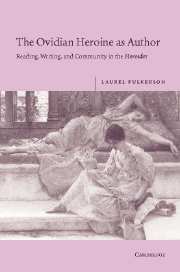Book contents
- Frontmatter
- Contents
- Acknowledgments
- List of abbreviations
- Introduction
- 1 Reading dangerously: Phyllis, Dido, Ariadne, and Medea
- 2 Reading the future?: Hypsipyle, Medea, and Oenone
- 3 Benefits of communal writing: Canace and Hypermestra
- 4 A feminine reading of epic: Briseis and Hermione
- 5 Reading magically: Deianira and Laodamia
- 6 Reading like a virgin: Phaedra and Ariadne
- 7 Caveat lector: thoughts on gender and power
- Appendix: The authenticity (and “authenticity”) of Heroides 15
- Bibliography
- Index
- Index Locorum
7 - Caveat lector: thoughts on gender and power
Published online by Cambridge University Press: 22 September 2009
- Frontmatter
- Contents
- Acknowledgments
- List of abbreviations
- Introduction
- 1 Reading dangerously: Phyllis, Dido, Ariadne, and Medea
- 2 Reading the future?: Hypsipyle, Medea, and Oenone
- 3 Benefits of communal writing: Canace and Hypermestra
- 4 A feminine reading of epic: Briseis and Hermione
- 5 Reading magically: Deianira and Laodamia
- 6 Reading like a virgin: Phaedra and Ariadne
- 7 Caveat lector: thoughts on gender and power
- Appendix: The authenticity (and “authenticity”) of Heroides 15
- Bibliography
- Index
- Index Locorum
Summary
This work has shown some of the mechanisms by which the women of the Heroides read and adapt one another's texts, sometimes to their detriment; it has also outlined some of their likely motivations for so doing. Often they are convinced that their own stories are like the stories of family members, but sometimes they merely grasp at texts that seem to share similarities to the ways in which they perceive their own situations. A “weak” reading would argue that, even if they are not always right, it is hardly their fault, and the tragic endings that befall most of the women of the Heroides because of their misunderstandings and misreadings serve only to place the women squarely where tradition has already located them. But the “strong” reading advocated here suggests that the women of the Heroides have the power to change the way we understand their stories. In either case, they have lost nothing by writing; indeed, they, and we, have gained much. Although they may be trapped by literature, their reading, or our reading of them, has been by no means fruitless: we can now see how many of the heroines came to find themselves in the positions our more canonical sources tell us they hold (Spentzou 2003: passim). By giving the heroines enough rope with which to hang themselves (sometimes literally), Ovid has vastly enriched our understanding of their stories.
- Type
- Chapter
- Information
- The Ovidian Heroine as AuthorReading, Writing, and Community in the Heroides, pp. 143 - 151Publisher: Cambridge University PressPrint publication year: 2005

